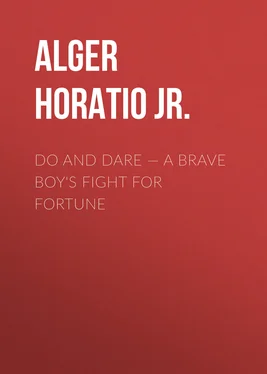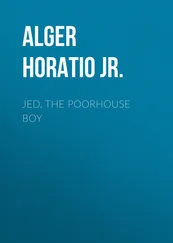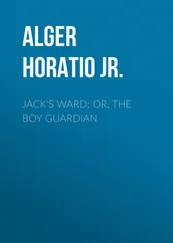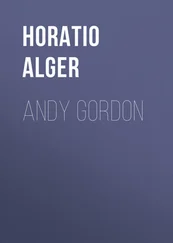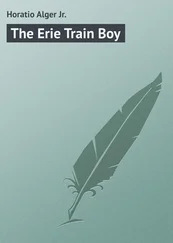Horatio Alger - Do and Dare — a Brave Boy's Fight for Fortune
Здесь есть возможность читать онлайн «Horatio Alger - Do and Dare — a Brave Boy's Fight for Fortune» — ознакомительный отрывок электронной книги совершенно бесплатно, а после прочтения отрывка купить полную версию. В некоторых случаях можно слушать аудио, скачать через торрент в формате fb2 и присутствует краткое содержание. Издательство: Иностранный паблик, Жанр: Детские приключения, literature_19, foreign_antique, foreign_prose, foreign_children, на английском языке. Описание произведения, (предисловие) а так же отзывы посетителей доступны на портале библиотеки ЛибКат.
- Название:Do and Dare — a Brave Boy's Fight for Fortune
- Автор:
- Издательство:Иностранный паблик
- Жанр:
- Год:неизвестен
- ISBN:нет данных
- Рейтинг книги:5 / 5. Голосов: 1
-
Избранное:Добавить в избранное
- Отзывы:
-
Ваша оценка:
- 100
- 1
- 2
- 3
- 4
- 5
Do and Dare — a Brave Boy's Fight for Fortune: краткое содержание, описание и аннотация
Предлагаем к чтению аннотацию, описание, краткое содержание или предисловие (зависит от того, что написал сам автор книги «Do and Dare — a Brave Boy's Fight for Fortune»). Если вы не нашли необходимую информацию о книге — напишите в комментариях, мы постараемся отыскать её.
Do and Dare — a Brave Boy's Fight for Fortune — читать онлайн ознакомительный отрывок
Ниже представлен текст книги, разбитый по страницам. Система сохранения места последней прочитанной страницы, позволяет с удобством читать онлайн бесплатно книгу «Do and Dare — a Brave Boy's Fight for Fortune», без необходимости каждый раз заново искать на чём Вы остановились. Поставьте закладку, и сможете в любой момент перейти на страницу, на которой закончили чтение.
Интервал:
Закладка:
“You are right, mother,” he said, more hopefully. “I was feeling low-spirited to-night, but I won’t feel so any more. I don’t see how we are to live, but I won’t let it trouble me tonight.”
“Let us do our part, and leave the rest to God,” said Mrs. Carr. “He won’t support us in idleness, but I am sure that in some way relief will come if we are ready to help ourselves.”
“God helps them that help themselves,” repeated Herbert.
“Exactly so. To-morrow is Sunday, and we won’t let any worldly anxieties spoil that day for us. When Monday comes, we will think over what is best to be done.”
The next day Herbert and his mother attended church in neat apparel, and those who saw their cheerful faces were not likely to guess the serious condition of their affairs. They were not in debt, to be sure, but, unless employment came soon, they were likely to be ere long, for they had barely enough money ahead to last them two weeks.
Monday morning came, and brought its burden of care.
“I wish there was a factory in Wayneboro,” said Herbert. “I am told that boys of my age sometimes earn six or seven dollars a week.”
“I have heard so. Here there seems nothing, except working on a farm.”
“And the farmers expect boys to take their pay principally in board.”
“That is a consideration, but, if possible, I hope we shall not be separated at meals.”
“I will try other things first,” said Herbert. “How would you like some fish for dinner, mother? My time isn’t of any particular value, and I might as well go fishing.”
“Do so, Herbert. It will save our buying meat, which, indeed, we can hardly afford to do.”
Herbert felt that anything was better than idleness, so he took his pole from the shed, and, after digging a supply of bait, set out for the banks of the river half a mile away.
Through a grassy lane leading from the main street, he walked down to the river with the pole on his shoulder.
He was not destined to solitude, for under a tree whose branches hung over the river sat a young man, perhaps twenty-five years of age, with a book in his hand.
CHAPTER VI. HERBERT’S GOOD LUCK
“Good-morning,” said the young man, pleasantly.
“Good-morning,” answered Herbert, politely.
He recognized the young man, though he had never seen him before, as a visitor from the city, who was boarding at the hotel, if the village tavern could be so designated. He seemed to be a studious young man, for he always had a book in his hand. He had a pleasant face, but was pale and slender, and was evidently in poor health.
“I see you are going to try your luck at fishing,” said the young man.
“Yes, sir; I have nothing else to do, and that brings me here.”
“I, too, have nothing else to do; but I judge from your appearance that you have not the same reason for being idle.”
“What is that, sir?”
“Poor health.”
“No, sir; I have never been troubled in that way.”
“You are fortunate. Health is a blessing not to be overestimated. It is better than money.”
“I suppose it is, sir; but at present I think I should value a little money.”
“Are you in want of it?” asked the young man, earnestly.
“Yes, sir; I have just lost my place in the post office.”
“I think I have seen you in the post office.”
“Yes, sir; my mother had charge of the office till two weeks since, when it was transferred to Mr. Graham. He employed me to attend to the duties, and serve the customers in the store, till Saturday night, when I was succeeded by his son, who had just returned from the city.”
“Your mother is a widow, is she not?”
“Yes, sir.”
“I know where you live; I have had it pointed out to me. Your father served in the war, did he not?”
“Yes, sir; and the injuries he received hastened his death.”
The young man looked thoughtful. Then he said: “How much did Mr. Graham pay you for your services?”
“Three dollars a week.”
“That was not—excuse the question—all you and your mother had to depend upon, was it?”
“Not quite; mother receives a pension of eight dollars per month.”
“Five dollars a week altogether—that is very little.”
“It is only two dollars now, sir.”
“True; but you have health and strength, and those will bring money. In one respect you are more fortunate than I. You have a mother—I have neither father nor mother.”
“I’m sorry for you, sir.”
“Thank you; anyone is to be pitied who has lost his parents. Now, as I have asked about your affairs, it is only fair that I should tell you about myself. To begin with, I am rich. Don’t look envious, for there is something to counterbalance. I am of feeble constitution, and the doctors say that my lungs are affected. I have studied law, but the state of my health has obliged me to give up, for the present at least, the practice of my profession.”
“But if you are rich you do not need to practice,” said Herbert, who may be excused for still thinking his companion’s lot a happy one.
“No, I do not need to practice my profession, so far as the earning of money is concerned; but I want something to occupy my mind. The doctors say I ought to take considerable out-door exercise; but I suppose my physical condition makes me indolent, for my chief exercise has been, thus far, to wander to the banks of the river and read under the trees.”
“That isn’t very severe exercise,” said Herbert, smiling.
“No; still it keeps me out in the open air, and that is something. Now tell me, what are your plans?”
“My hope is to find something to do that will enable me to help mother; but there doesn’t seem much chance of finding anything in Wayneboro. Do you think I could get a place in the city?”
“You might; but even if you did, you would find it difficult to earn your own living, and there would be no chance of your helping your mother.”
Herbert, though naturally sanguine and hopeful, looked sober. Just then he had a bite, and drew out a good-sized pickerel. This gave a new direction to his thoughts, and he exclaimed, triumphantly:
“Look at this pickerel! He must weigh over two pounds.”
“All of that,” said the young man, rising and examining the fish with interest. “Let me use your pole, and see what luck I have.”
“Certainly.”
The young man, some ten minutes later, succeeded in catching a smaller pickerel, perhaps half the size of Herbert’s.
“That will do for me,” he said, “though it doesn’t come up to your catch.”
For two hours Herbert and his friend alternately used the pole, and the result was quite a handsome lot of fish.
“You have more fish than you want,” said the young man. “You had better bring what you don’t want to the hotel. I heard the landlord say he would like to buy some.”
“That would suit me,” said Herbert. “If he wants fish, I want money.”
“Come along with me, then. Really, I don’t know when I have passed a forenoon so pleasantly. Usually I get tired of my own company, and the day seems long to me. I believe I see my way clear to a better way of spending my time. You say you want a place. How would you like me for an employer?”
“I am sure I should like you, but you are not in any business.”
“No,” said the young man, smiling; “or, rather, my business is the pursuit of health and pleasure just now. In that I think you can help me.”
“I shall be very glad to, if I can, Mr.—-”
“My name is George Melville. Let me explain my idea to you. I want your company to relieve my solitude. In your company I shall have enterprise enough to go hunting and fishing, and follow out in good faith my doctor’s directions. What do you say?”
Читать дальшеИнтервал:
Закладка:
Похожие книги на «Do and Dare — a Brave Boy's Fight for Fortune»
Представляем Вашему вниманию похожие книги на «Do and Dare — a Brave Boy's Fight for Fortune» списком для выбора. Мы отобрали схожую по названию и смыслу литературу в надежде предоставить читателям больше вариантов отыскать новые, интересные, ещё непрочитанные произведения.
Обсуждение, отзывы о книге «Do and Dare — a Brave Boy's Fight for Fortune» и просто собственные мнения читателей. Оставьте ваши комментарии, напишите, что Вы думаете о произведении, его смысле или главных героях. Укажите что конкретно понравилось, а что нет, и почему Вы так считаете.
